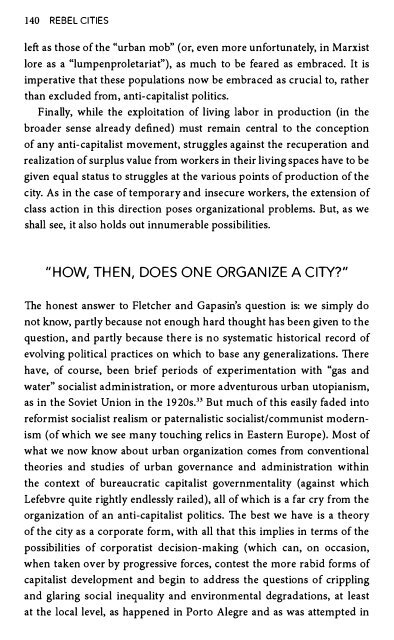Rebel Cities-David Harvey
Rebel Cities-David Harvey
Rebel Cities-David Harvey
- No tags were found...
You also want an ePaper? Increase the reach of your titles
YUMPU automatically turns print PDFs into web optimized ePapers that Google loves.
140 REBEL CITIESleft as those of the "urban mob" (or, even more unfortunately, in Marxistlore as a "lumpenproletariat"), as much to be feared as embraced. It isimperative that these populations now be embraced as crucial to, ratherthan excluded from, anti-capitalist politics.Finally, while the exploitation of living labor in production (in thebroader sense already defined) must remain central to the conceptionof any anti-capitalist movement, struggles against the recuperation andrealization of surplus value from workers in their living spaces have to begiven equal status to struggles at the various points of production of thecity. As in the case of temporary and insecure workers, the extension ofclass action in this direction poses organizational problems. But, as weshall sec, it also holds out innumerable possibilities."HOW, TH EN, DOES ONE ORGAN IZE A CITY?"The honest answer to Fletcher and Gapasin's question is: we simply donot know, partly because not enough hard thought has been given to thequestion, and partly because there is no systematic historical record ofevolving political practices on which to base any generalizations. Therehave, of course, been brief periods of experimentation with "gas andwater" socialist administration, or more adventurous urban utopianism,as in the Soviet Union in the 1920s.33 But much of this easily faded intoreformist socialist realism or paternalistic socialist/communist modernism(of which we see many touching relics in Eastern Europe). Most ofwhat we now know about urban organization comes from conventionaltheories and studies of urban governance and administration withinthe context of bureaucratic capitalist govcrnmcntality (against whichLefebvre quite rightly endlessly railed), all of which is a far cry from theorganization of an anti-capitalist politics. The best we have is a theoryof the city as a corporate form, with all that this implies in terms of thepossibilities of corporatist decision-making (which can, on occasion,when taken over by progressive forces, contest the more rabid forms ofcapitalist development and begin to address the questions of cripplingand glaring social inequality and environmental degradations, at leastat the local level, as happened in Porto Alegre and as was attempted in


